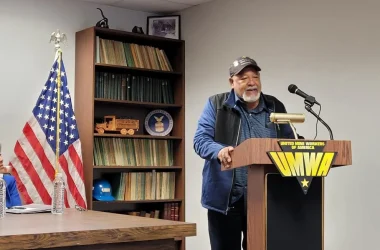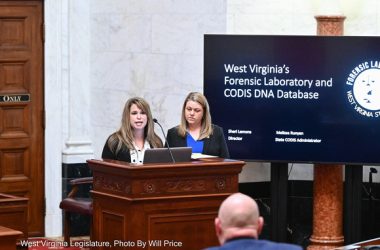By LACIE PIERSON
The Herald-Dispatch
HUNTINGTON, W.Va. — What started out as a one-off assignment from Marshall University associate history professor David Trowbridge a few years ago has become a hive for historical research and activity that grows by leaps and bounds each day.
Since its launch in 2012 and with the help of thousands of students and experts, the Clio mobile app and website has grown from a handful of entries to more than 13,000 entries around the world and growing each day, and there’s still so much further to go, according to Trowbridge.
“It’s constantly getting bigger,” Trowbridge said while putting in office hours during Marshall’s winter break on Dec. 28, 2016. “There were over 1,000 improvements made to existing entries in the last 30 days. There are 13,000 entries. One person can’t do this on their own, and it all started here in Huntington.”
The award-winning Clio serves as a museum in your pocket or on your desk, and it provides an ever-growing database of museums, art galleries, monuments, sculptures and historical sites large and small.
Each entry contains a brief explanation of a site’s historical significance as well as photos, and as of late, more of those entries are being synched to Google Maps and Google Street View as well as 360-degree views of the sites themselves, Trowbridge said.
In May, Clio had more than 20,000 users each month and had reached 10,000 unique entries, which means 3,000 entries had been added to the platform in a seven-month span, by Trowbridge’s calculations.
“The beauty of technology should be that we design things that make us not as reliant on them,” Trowbridge said. “I’m trying to create something that, if you use Clio before you go to a place, you can leave it in your pocket and just explore and really be there when you’re exploring.”
Clio also includes customizable city tours. Those who are looking for an adventure can add, subtract and change the order of historical sites they’d like to visit in a given area, an experience that has been amplified with the incorporation of the Google services, Trowbridge said.
“By combining these things, you can be a lot more accurate,” Trowbridge said. “That matters when you’re trying to find something small, and it’s also cool because you can really get a sense of the place you want to go visit.”
Even with the addition of the latest technology applicable, it’s still the elbow grease and human expertise that is the bread and butter of Clio, Trowbridge said.
As often as possible, Trowbridge helps facilitate internships throughout the country and the assistance of graduate students, historical societies, public libraries and other entities to produce the expertly vetted content for Clio.
“It’s an open project,” Trowbridge said. “We vet all the information, but anyone can contribute. As long as it’s accurate and well-written, we’re going to use it.”
Trowbridge compared the process of contributing to Clio to the process of contributing to Wikipedia. On the surface, they’re similar, but in practice, they’re different.
“We vet the content from the front end,” Trowbridge said. “There’s not been much of a vandalism issue (in Clio), like with Wikipedia, where everything’s anonymous. That doesn’t work. Expertise matters.”
Each Clio contributor must create an account, and there are separate kinds of accounts for groups like historical societies, museums and public libraries that allow multiple people within those entities to view and edit entries.
No matter what, when someone creates an entry, it stays in a “draft mode” until it’s been scrutinized by other experts in the Clio community before it is made public.
It’s an experience that can be especially valuable to undergraduate students in Trowbridge’s classes, each of whom is required to complete at least one Clio entry during a semester in his class.
“They learn to value facts – not just value them, but they learn to demand them in their lives,” Trowbridge said. “What’s driving me is the education aspect where students learn over the course of a semester to become an expert in one thing. They know more about this one site they picked than probably almost anybody alive. They learn how to dig for facts. They go well beyond an internet search. They make phone calls. They dig and they find stuff, and they have to go to work writing.”
For those who might not be historical experts, there are still options to support a locally sourced and internationally cultivated resource.
Clio is a 501(c)(3) organization, which means all contributions to Clio are tax deductible, and Trowbridge said funding for the app contributes to supporting maintenance of the application as well as to providing internships throughout the country.
“Eventually, this is going to be a digital museum of America, where every urban space, every building, every marker, every monument is an artifact ready for interpretation, and you can just walk through your town and it will be like having a bunch of historians with you,” he said.
To become a historical or financial contributor to Clio, visit www.theclio.com.
See more from The Herald-Dispatch





